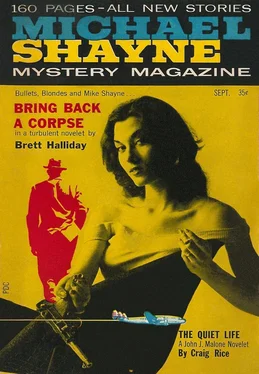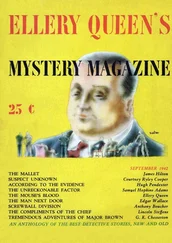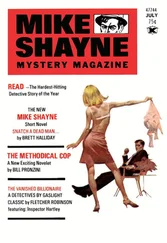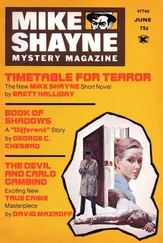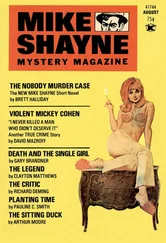Robert Bloch - Michael Shayne Mystery Magazine. Vol. 1, No. 1. September 1956
Здесь есть возможность читать онлайн «Robert Bloch - Michael Shayne Mystery Magazine. Vol. 1, No. 1. September 1956» весь текст электронной книги совершенно бесплатно (целиком полную версию без сокращений). В некоторых случаях можно слушать аудио, скачать через торрент в формате fb2 и присутствует краткое содержание. Город: New York, Год выпуска: 1956, Издательство: Renown Publications, Жанр: Детектив, на английском языке. Описание произведения, (предисловие) а так же отзывы посетителей доступны на портале библиотеки ЛибКат.
- Название:Michael Shayne Mystery Magazine. Vol. 1, No. 1. September 1956
- Автор:
- Издательство:Renown Publications
- Жанр:
- Год:1956
- Город:New York
- ISBN:нет данных
- Рейтинг книги:3 / 5. Голосов: 1
-
Избранное:Добавить в избранное
- Отзывы:
-
Ваша оценка:
- 60
- 1
- 2
- 3
- 4
- 5
Michael Shayne Mystery Magazine. Vol. 1, No. 1. September 1956: краткое содержание, описание и аннотация
Предлагаем к чтению аннотацию, описание, краткое содержание или предисловие (зависит от того, что написал сам автор книги «Michael Shayne Mystery Magazine. Vol. 1, No. 1. September 1956»). Если вы не нашли необходимую информацию о книге — напишите в комментариях, мы постараемся отыскать её.
Michael Shayne Mystery Magazine. Vol. 1, No. 1. September 1956 — читать онлайн бесплатно полную книгу (весь текст) целиком
Ниже представлен текст книги, разбитый по страницам. Система сохранения места последней прочитанной страницы, позволяет с удобством читать онлайн бесплатно книгу «Michael Shayne Mystery Magazine. Vol. 1, No. 1. September 1956», без необходимости каждый раз заново искать на чём Вы остановились. Поставьте закладку, и сможете в любой момент перейти на страницу, на которой закончили чтение.
Интервал:
Закладка:
Now the little guy was looking over the crowd, past my shoulder. I saw his eyes widen, then swing to me. They were small eyes, very dark, and suddenly there was a mean look in them.
He said, “How about resting while someone else tries?”
“I feel like pitching,” Teel said.
A man of about my width, but a head shorter, pushed forward. I recognized him as an unsavory bar-bum I had seen drifting around town at times.
“Lemme pitch a couple,” he said. “You been here all afternoon, bud.”
Teel looked down at this character and away. He resumed rubbing the ball he held. The heavy-set guy gave him an elbow. “I said, move over.”
The farmer wasn’t having any. “I got here first.”
There was a nasty look on the wide man’s face. It was a slightly battered face, like mine. But where my nose was bent twice, his was flattened to one side of his face. His ears were cauli-flowered, too. He looked as if he would enjoy getting tough about it.
“Bud, you just step aside...”
The whole group of farmers shifted their weight, and a soft sound, like a sighing wind, rose from them. They began to close in. It was very nice teamwork. I thought, You guys aren’t smart. Farmers haven’t been yokels for thirty years now.
It was obvious to me, and evidently to the farmers, too. The heavy boy was a shill, and the attendant wanted him up there very badly.
The attendant wasn’t quite as stupid as he looked. He said, “Let him shoot, friend. He says he’s hot.” Their eyes met, and the wide boy nodded and stepped back. The sigh went through the crowd again, and they relaxed a little. The farmer wound up and pitched.
It was perfect, just like the first one. The bottles jumped and rocked, but when they had settled, two still stood, one on either end. It was like a split in bowling. The farmer blinked and spat and took another ball. He wound up and got a strike on the left one. It just leaned over, wobbled, and came back. So he had one ball left and the same split to work on.
“You see that!” one wag said. “Jumped off and right back on. You got ’em trained, mister?”
“Tough luck,” the attendant said. “One ball to go.”
I leaned over the counter. I caught the pitchman by the front of his shirt and lifted him six inches off the ground.
“Friend,” I said softly, “give the man two balls and take your hand off that magnet.”
His little black eyes popped out and the meanness narrowed his mouth. “Who in hell are you?” I thought he looked a little sick.
I shook him, but not too roughly. “Want me to say it louder, chum?” I said. “Set the man up a square table this time.”
The little attendant opened his mouth and breathed stale beer at me. Before he could do anything cute like yelling, “Hey, rube,” I pushed a gentle hand against his face. “Now behave,” I told him.
The heavy-set character was beginning to ease my way. I heard the crowd stir again. I jerked the attendant up a few more inches. “It’s thirty against two here, chum.”
He was beginning to look worried, but then he must have seen something over my shoulder. He shook his head sideways, getting free of my hand, and bawled.
Someone conked me from behind. I dropped the little guy and folded over the counter, rolled, and came up with my back to it. My head hurt in the old way, making me sick to my stomach, but I was sore, too — a little too sore to know exactly what I was doing. A roustabout was there, swinging a big stick. The heavy boy had closed in on the other side.
I made a grab for the guy with the stick. He swung again, thumping my shoulder. I had two hands on his neck when the shill jumped me. The farmers got into action then. All I could see were feet and knees and swirling dust. I was on the bottom, hanging onto the guy who had sapped me. But from the sounds, I knew it had turned into a general riot.
Someone blew a whistle then, and a siren screamed nearby. I lay there, after knocking my man silly and using him to cover me from random feet. After a while, the mob thinned and daylight began to appear. When the dust had settled, the cops were in control.
This was outside the city limits, so the sheriff’s office had the say. I saw Grimsby, old Poo-bah himself, and wished I were somewhere else. Just as I feared, the job had backfired.
“I should have known,” he said, “ you’d be in this.”
“They pulled the magnet gag on some farmer,” I said. “I objected.”
The pitchman and his shill were backed up against the counter, looking very unhappy. The remains of the farmers, about twenty-five, were lined up at right angles. About a dozen carny helpers were there, too. Finally, a dapper little man in ice-cream pants came clicking up.
“Here, what’s the trouble, officer.”
This was Jim Nichols, the man who had hired me. It was his twenty bucks I carried in my pocket. He spotted me, but his eyes said they didn’t know me. I returned the compliment.
The dust had settled, most of it in my mouth from the way it felt, and things were beginning to clear in my mind. The wallop on the head hadn’t been quite as tough as I had thought. I stepped forward and repeated my story to Nichols.
He turned on the rat-faced attendant. “That’s twice I’ve had complaints about you, Ormes. Is this true?”
The sheriff said, “Don’t you know how your own games are run?”
Nichols bridled like a nipped dog. “Sheriff, I rent out these concessions. I am not responsible for the actions of these men.”
Ormes, the pitchman, said, “This farmer got greedy. He won a radio and wanted another. I can’t let no rube Bob Feller clean out my stock, can I?”
“If he wins on a game of chance, you can,” the sheriff said.
I shook my head to get the last of the buzzing out. “I suggested he let the farmer do that second one all over again.”
Grimsby looked from Nichols to Ormes. “If you ain’t beat him up too bad, let him try.”
Ormes looked like he wanted to squawk, but one glare from Nichols stopped him. When Grimsby added, “Or we lock you up,” he set up the bottles.
I went right after him and checked them. It looked all wood, this table. But a closer check showed iron insets painted the color of the table top. Some of the bottles had iron insets, too. I showed the setup to Grimsby.
The farmers didn’t like it a bit, but they cheered when the sheriff found the electric cable that ran from the stand to the push-button on the counter. He gave a yank and disconnected the works.
“Now throw, Teel,” he said. He was grinning, too, pleased with himself. “Make like that’s Sunnyvale up there.”
Teel was still in one piece, as long and as lugubrious as ever. He wound up, pitched and got a strike. The bottles flew off their table on the first pitch. He stood there after he had made it and looked at Ormes, not smiling.
Ormes reached up and got the last radio, a white plastic one. He handed it over, not happily. Teel tucked both radios under his arm and moved off. “Thanks,” he said.
He turned and came back to me. “You, too,” he added. His sun-faded blue eyes were speculative. “But I don’t know why you did it.”
“I don’t like to see a man cheated,” I said.
He pointed to a bruise on my face. “No more do I. Come on and have a beer on me.”
I did, carrying my radio. This carny was no place for Jake Parker at the moment, anyway. We found a tavern on the edge of the grounds and, with about five other farm boys tagging along, went inside. It was cool and pleasant. So was the beer.
Teel seemed pleased with his prizes. “I’d have liked a brown one,” he said. “Then Martha could choose which color she wanted to keep.”
Читать дальшеИнтервал:
Закладка:
Похожие книги на «Michael Shayne Mystery Magazine. Vol. 1, No. 1. September 1956»
Представляем Вашему вниманию похожие книги на «Michael Shayne Mystery Magazine. Vol. 1, No. 1. September 1956» списком для выбора. Мы отобрали схожую по названию и смыслу литературу в надежде предоставить читателям больше вариантов отыскать новые, интересные, ещё непрочитанные произведения.
Обсуждение, отзывы о книге «Michael Shayne Mystery Magazine. Vol. 1, No. 1. September 1956» и просто собственные мнения читателей. Оставьте ваши комментарии, напишите, что Вы думаете о произведении, его смысле или главных героях. Укажите что конкретно понравилось, а что нет, и почему Вы так считаете.
